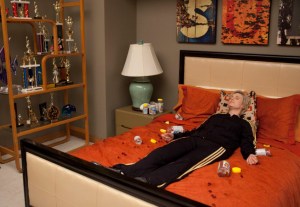
FOX
Spoilers for last night’s Glee follow:
After Josh Levin’s essay in Slate, there’s been a lot of discussion this week about the effect that weekly online reviews of shows have on TV criticism. (Here’s my response to Levin’s piece; see also Myles McNutt’s and Alan Sepinwall’s responses if you’re curious, and Levin’s response to the responses if you really want to go down the rabbit hole.) One potential problem with weekly reviews—like the Watches at this blog—is that they tend to follow shows the particular critic likes, which in turn can create the expectation that reviewing is supposed to mainly be about praise. If you don’t like [name of show/episode here], readers will sometimes ask, why write about it?
My answer is that TV is worth writing about not because it’s good or bad, but because it’s interesting. And one of the first examples I’ll usually cite is Glee. When it’s good—see last week—it’s good in risky and surprising ways. When it’s bad, it’s usually bad in ways that other TV shows aren’t, which can be fascinating in itself.
All of which is a long way of saying that my least favorite Glee episodes are ones like “Comeback,” which was not even bad in a memorable way.
Structurally, “Comeback” was essentially a collection of subplots. What, exactly, was it trying to achieve as an episode? Why did it need to exist? As best as I can answer: to work in some Justin Bieber songs; to advance (very slightly) the Sam-Quinn-Finn-Rachel quadrangle; to remind us that regionals are still coming up; and to give us more Sue Sylvester after a Sue-less outing last week.
Frankly, the Bieber subplot was probably the strongest element of the episode. No, it wasn’t essential, but the show had fun with the phenomenon—the reaction shots showing the girls smitten by Sam’s imitation and the boys disgusted—in a way that captured the disposable fun of The Bieb’s music without either sneering at it or making it more than it is. (I do get tired of Glee feeling it needs to pay lip service to the artists who give it permission to use their music, as when Tina says, “It’s actually a really good song”—if it is, you shouldn’t have to say it. But it was much better than the hourlong genuflection of the Madonna episode.) And in a small way it captured something about Sam’s character, underscored by Santana’s needling him about his fixation on doing impressions: like his Bieber performance, basically an on-stage impression, they symbolize that he hasn’t really figured out who he is.
In the Rachel and Sue storylines, however, “Comeback” seemed to be a title in search of a reason for existing. (This was one of those episodes, like “Funk,” where the script was compelled to literally mention the title every few minutes, which only makes it feel like the writer is trying to sell himself on the concept.) I can buy that Rachel, who’s seemed rudderless for a while, especially since her breakup with Finn, needs to find, well, new direction. But “Comeback” seemed to be trying less to advance her character then simply to give her something to do. And even with not one but two subplots devoted to her—her attempt to become a fashion trendsetter and her diva-off with Mercedes—the episode didn’t do much besides remind us of the emotional place we already knew she was in.
(Credit where due, though, for the funniest Brittany line in several episodes: “When people look at you they don’t see what you’re wearing. They see a cat getting its temperature taken, and then they hear it screaming.”)
As for Sue’s storyline, it’s getting hard to see her as anything but a burden on the show right now—a breakout character who’s broken out of the constraints of recognizable character. (Her violent freakout in the hallway, like her rampage in the post–Super Bowl episode, was not even funny, just sociopathic. And if we’re not meant to see it as funny, then it invites the serious question of how she hasn’t been brought up on some sort of charges.)
Even if we ignore the lame, unconvincing “Sue-icide” scene or the unsurprising ending in which we learn that nothing has changed and she’s going to continue to torment the glee club: what was the point of her journey in the rest of the episode? Having her sing with Will to sick children, manipulative though the scene was, could have been a way of humanizing her in a fresh way—except that we already know, through her history with her sister, that Sue is capable of compassion and has her own, if idiosyncratic, ideas of integrity and empathy.
All this did was remind us of what Glee had already done with her, earlier and better. And it represented in miniature the trap that the writers (last night’s episode, by the way, was a Ryan Murphy) are now in with Sue. They created an arresting, exaggerated character played by a fabulous comic actress, and fans responded to her. They also know—and have tried to show—that she’s a more complex person than the hilarious monster she began as. But people looooooove the hilarious monster (or so Glee seems to believe). So they’re forced to keep whiplashing her around, taking her through episodes in which she’s allowed to be an identifiable person for a scene or two until (looks at watch)—sorry, time’s up! Back to fun, crazy, evil Sue! Oooh, she’s gonna get that glee club! Don’t worry, nothing has changed!
The thing that gives me hope are episodes like “Silly Love Songs” last week, which show that Glee can be weird and exuberant while still feeling emotionally true. More and more often, these are the episodes focused almost entirely on the kids. But will Glee’s adults ever get the chance to grow up?


